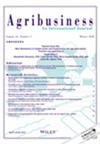How do both firm‐level resources and country‐level competitiveness shape the relationship between alliance portfolio diversity and radical innovation? A comparison between the food and other manufacturing industries
IF 2
3区 经济学
Q2 AGRICULTURAL ECONOMICS & POLICY
引用次数: 0
Abstract
This study examines how European food companies can operationally leverage the value created by strategic alliances into commercially viable products. More importantly, it emphasizes that the effects of alliance portfolio diversity (APD) on radical innovation performance can be achieved not only directly, but also via moderating roles, that is, the firm's social capital and the level of competitiveness of the country. Using three waves of the European Community Innovation Survey, our results show that the optimal level of APD varied depending on the industry in which the company operates (food manufacturing industry vs. the rest of manufacturing industries). Furthermore, social capital seems to be a crucial factor to mitigate the difficulties of leveraging very diverse knowledge from partners, especially in the food manufacturing industry. Moreover, the external environmental context where the firm is operating, measured as the growth competitive index that reflects the competitive level of the country, was shown to have an influence on the firms' innovative efforts.[EconLit Citations: M10, 013, 036].企业层面的资源和国家层面的竞争力如何影响联盟组合多样性与激进创新之间的关系?食品行业与其他制造业的比较
本研究探讨了欧洲食品公司如何在运营中将战略联盟创造的价值转化为商业上可行的产品。更重要的是,它强调了联盟组合多样性(APD)对根本性创新绩效的影响不仅可以直接实现,还可以通过调节作用(即企业的社会资本和国家的竞争力水平)来实现。利用欧洲共同体创新调查的三个波次,我们的结果表明,APD 的最佳水平因公司所处行业(食品制造业与其他制造业)而异。此外,社会资本似乎是一个关键因素,它可以减轻企业从合作伙伴那里获取多种知识的困难,尤其是在食品制造业。此外,企业所处的外部环境(以反映国家竞争水平的增长竞争指数衡量)也对企业的创新努力产生了影响。
本文章由计算机程序翻译,如有差异,请以英文原文为准。
求助全文
约1分钟内获得全文
求助全文
来源期刊

Agribusiness
农林科学-食品科技
CiteScore
5.50
自引率
6.20%
发文量
58
审稿时长
6 months
期刊介绍:
Agribusiness: An International Journal publishes research that improves our understanding of how food systems work, how they are evolving, and how public and/or private actions affect the performance of the global agro-industrial complex. The journal focuses on the application of economic analysis to the organization and performance of firms and markets in industrial food systems. Subject matter areas include supply and demand analysis, industrial organization analysis, price and trade analysis, marketing, finance, and public policy analysis. International, cross-country comparative, and within-country studies are welcome. To facilitate research the journal’s Forum section, on an intermittent basis, offers commentary and reports on business policy issues.
 求助内容:
求助内容: 应助结果提醒方式:
应助结果提醒方式:


